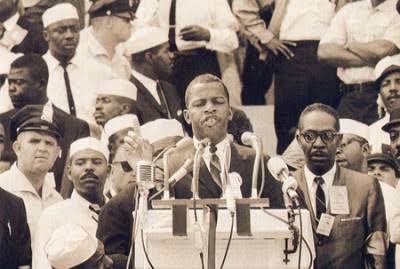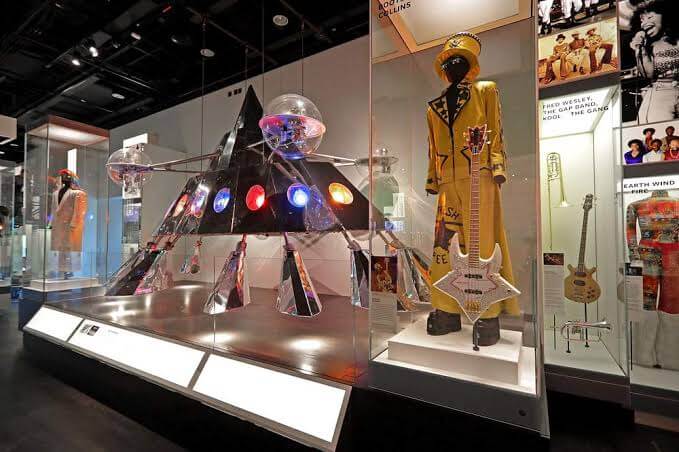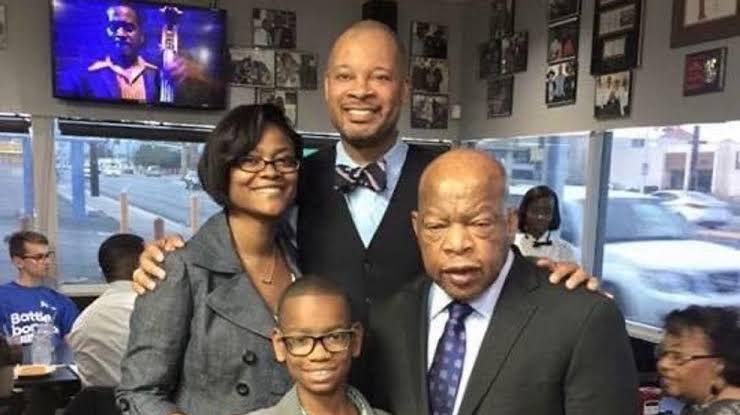John Lewis
John Robert Lewis (February 21, 1940 - July 17, 2020) was an American politician and civil rights activist who represented Georgia's 5th congressional district in the United States House of Representatives from 1987 until he died in 2020. He took part in the 1960 Nashville sit-ins and Freedom Rides, served as chairman of the Student Nonviolent Coordinating Committee (SNCC) from 1963 to 1966, and was one of the "Big Six" leaders of groups who organized the 1963 March on Washington. Fulfilling many vital roles in the civil rights movement and its actions to end legalized racial segregation in the United States, Lewis led the first of three Selma to Montgomery marches across the Edmund Pettus Bridge in 1965, where state troopers and police attacked Lewis and the other marchers in an incident that became known as Bloody Sunday. Lewis, a Democrat, was first elected to the United States House of Representatives in 1986 and served 17 terms. He represented the majority of Atlanta in his district. Because of his years of service, he was named the dean of Georgia's congressional delegation. Lewis was a Democratic Party leader in the House, serving as a chief deputy whip from 1991 to 2003 and then as a senior chief deputy whip from 2003 to 2007. He received numerous honorary degrees and awards, including the Presidential Medal of Freedom in 2011. Student Movement in NashvilleLewis started involved in the civil rights movement as a student. As part of the Nashville Student Movement, he organised sit-ins at segregated lunch counters and participated in a variety of other civil rights activities. The Nashville sit-in campaign was responsible for the desegregation of downtown lunch counters. During the nonviolent efforts to desegregate the city's downtown businesses, Lewis was arrested and jailed numerous times. He was also a driving force behind the organisation of bus boycotts and other nonviolent protests in favour of voting rights and racial equality. During this period, Lewis stated that it was critical to engage in "good difficulty, necessary trouble" in order to effect change, and he kept this belief throughout his life. The Rev. James Lawson and Rev. Kelly Miller Smith urged Lewis to attend nonviolence classes at Clark Memorial United Methodist Church when he was a student. Lewis and his classmates dedicated themselves to the discipline and idea of nonviolence, which he practiced for the remainder of his life. Freedom RidersLewis was one of the first 13 Freedom Riders in 1961. The party of seven blacks and six whites planned to take interstate buses from Washington, D.C., to New Orleans to protest the policies of Southern states along the route, which had imposed segregated seating on the buses in violation of federal interstate transportation legislation. The Freedom Ride was founded by the Fellowship of Reconciliation and revived by James Farmer and the Congress of Racial Equality (CORE) to put pressure on the federal government to enforce the Supreme Court decision in Boynton v. Virginia (1960), which declared segregated interstate bus travel unconstitutional. The Freedom Rides exposed local, state, and federal government's inaction in the face of violence against law-abiding citizens. The project had been advertised, and the organisers had contacted the Department of Justice. Although Alabama was famed for its racism, it was up to the police to protect the riders. It took no action other than sending FBI agents to document incidents. After violent violence erupted in South Carolina and Alabama, the Kennedy administration declared a moratorium on Freedom Rides. In the South, Lewis and other peaceful Freedom Riders were attacked and jailed by enraged crowds. Lewis, then 21, was the first of the Freedom Riders to be assaulted in Rock Hill, South Carolina. Two white males attacked him when he attempted to enter a whites-only waiting room, bruising his face and kicking him in the ribs. Lewis then boarded a "Freedom Ride" destined for Jackson, Mississippi, two weeks later. Lewis detailed the brutality he and the other initial Freedom Riders faced in an interview with CNN on the 40th anniversary of the Freedom Rides. In Birmingham, the Riders were attacked with baseball bats, chains, lead pipes, and stones by an unruly mob that included KKK members who had been informed of their presence by police. They were arrested and led across the border into Tennessee before being released. The Riders reassembled and rode to Montgomery, where they encountered even more violence. Lewis was hit in the head with a wooden crate there. "It was quite violent. I was afraid I was going to die. I was found unconscious at the Greyhound bus station in Montgomery ", Lewis reflected on the incident. Lewis got a nationally broadcast apology from Elwin Wilson, a white southerner and former Klansman, 48 years after the Montgomery incident. Lewis wrote in 2015 that he knew New York-based activists Michael Schwerner and Andrew Goodman. They were abducted and murdered in June 1964 in Neshoba County, Mississippi, along with James Chaney, a local African-American activist from Mississippi, by members of the Ku Klux Klan, including law enforcement. SNCC Chairman
When Charles McDew resigned as head of the Student Nonviolent Coordinating Committee (SNCC) in 1963, Lewis, a founding member, was elected to replace him. Lewis's experience was already well-known. His bravery and dogged commitment to the ideology of reconciliation and nonviolence had allowed him to emerge as a leader. In the peaceful campaign for equal justice, he had already been detained 24 times. Lewis, as chairman of the SNCC, was one of the "Big Six" organizers organizing the March on Washington that summer. He was slated to speak fourth, ahead of the final speaker, Dr. Martin Luther King. Whitney Young, A. Philip Randolph, James Farmer, and Roy Wilkins were among the other leaders. Lewis had drafted a rebuttal to Kennedy's Civil Rights Act of 1963. The federal government's inaction had victimized Lewis and his fellow SNCC workers in the face of Southern violence. He intended to criticize Kennedy's bill for failing to protect African Americans from police violence or to provide African Americans with the right to vote; he called the law "too little, too late." When copies of the speech were circulated on August 27, the other march chairs demanded that it be altered. During the performance, James Forman rewrote Lewis's address on a portable typewriter in a small anteroom behind Lincoln's statue. In 1964, the SNCC established Freedom Schools and started the Mississippi Freedom Summer voter education and registration campaign. Lewis oversaw SNCC's operations for Freedom Summer, a campaign to register black voters in Mississippi and recruit college student activists to help with the endeavor. Lewis traversed the country, pushing students to spend their summer vacation trying to help people vote in Mississippi, which had the fewest black voters and the most opposition to the cause. During the 1965 Selma voting rights campaign, Lewis organised part of the voter registration operations, and he became nationally renowned for his significant role in the Selma to Montgomery marches. Lewis and fellow activist Hosea Williams led nearly 600 demonstrators across the Edmund Pettus Bridge in Selma, Alabama, on March 7, 1965, a day that became known as "Bloody Sunday." Alabama State Troopers greeted them at the bridge's terminus and the city-county line and ordered them to disperse. When the marchers stopped to pray, police fired tear gas at them, and mounted troops charged them, hitting them with nightsticks. Lewis' skull was shattered, but he was able to escape across the bridge to Brown Chapel, the movement's headquarters in Selma. Lewis was scarred on his skull for the rest of his life as a result of this tragedy. Lewis was the SNCC's chairman until 1966, when Stokely Carmichael succeeded him. Work in GovernmentIn January 1977, incumbent Democratic U.S. Congressman Andrew Young of Georgia's 5th congressional district resigned to become President Jimmy Carter's U.S. Ambassador to the United Nations. In the March 1977 open primary, Atlanta City Councilman Wyche Fowler received 40% of the vote but fell short of the 50% required to win outright. Lewis came in second place with 29% of the vote. Fowler defeated Lewis 62%-38% in the April election. Lewis chose a post with the Carter administration as associate director of ACTION, where he was in charge of the VISTA programme, the Retired Senior Volunteer Program, and the Foster Grandparent Program after his lost attempt. He was in that position for two and a half years until retiring as the 1980 election neared. Lewis ran for an at-large seat on the Atlanta City Council in 1981. He was elected to the council with 69% of the vote and served until 1986. Lewis skipped George W. Bush's inauguration in January 2001 by remaining in his Atlanta district. He did not attend the inauguration ceremony because he did not feel Bush was the legitimately elected president. Lewis later joined 30 other House Democrats in voting not to count Ohio's 20 electoral votes in the 2004 presidential election. Lewis spoke to an audience of 30,000 people in Oregon in March 2003, just before the Iraq War began. He was detained in 2006 and 2009 for protesting the slaughter in Darfur outside the Sudanese embassy. He was one of eight U.S. Representatives from six states detained while advocating for immigration reform during a sit-in near the west side of the U.S. Capitol building. National African American Museum
Lewis sponsored legislation to establish a national African American museum in Washington the year after he was elected to Congress. The bill failed, and he continued to propose it with each new Congress for the next 15 years. It was always defeated in the Senate, most notably by conservative Southern Senator Jesse Helms. Helms retired in 2003. The bill received bipartisan support, and President George W. Bush signed it into law, with the Smithsonian's Board of Regents deciding on the location. The National Museum of African American History and Culture, which is located next to the Washington Monument, celebrated its grand opening on September 25, 2016. Personal Life
Lewis met Lillian Miles during a Xernona Clayton-hosted New Year's Eve party. In 1968, they married. They adopted one son, John-Miles Lewis, in 1976. Lillian passed away on December 31, 2012. Lewis stated on December 29, 2019, that he had been diagnosed with stage IV pancreatic cancer. He stayed in the Washington, DC region for therapy. According to Lewis: "I've spent virtually my entire life fighting for freedom, equality, and basic human rights. I've never faced a battle exactly like this one." Lewis died on the same day as his friend and fellow civil rights hero C.T. Vivian on July 17, 2020, at the age of 80, after suffering from cancer for eight months in Atlanta. Lewis was the last of the "Big Six" civil rights icons to die. In response to Lewis's death, then-President Donald Trump ordered that all flags be flown at half-staff. International leaders sent condolences, including Swedish Prime Minister Stefan Löfven, French President Emmanuel Macron, and Irish President Michael D. Higgins, among others. HonoursLewis was commemorated by Thornton Dial's 1997 sculpture, The Bridge, which was dedicated to him at Ponce de Leon Avenue and Freedom Park in Atlanta. Lewis received the Wallenberg Medal from the University of Michigan in 1999 for his brave lifelong commitment to defending civil and human rights. In the same year, he was awarded the Four Freedoms Award for Freedom of Expression. Lewis received the Profile in Courage Award from the John F. Kennedy Library Foundation in 2001 "for his outstanding courage, leadership, and devotion to civil rights." It is a lifetime achievement award that has only been granted twice to John Lewis and William Winter (in 2008). The NAACP gave him the Spingarn Medal the following year. Lewis won the American Academy of Achievement's Golden Plate Award in 2004, which Awards Council member James Earl Jones awarded. In 2006, he earned the U.S. Senator John Heinz Award for Greatest Public Service by an Elected or Appointed Official, an award given out by Jefferson Awards for Public Service on an annual basis. Lewis received the Dole Leadership Prize from the University of Kansas' Robert J. Dole Institute of Politics in September 2007. Lewis was the only living March on Washington speaker present on the stage during Barack Obama's inauguration. Obama wrote on a commemorative photograph for Lewis, " "Thanks to you, John. Barack Hussein Obama". It was announced in 2016 that a future US Navy underway replenishment oiler would be called USNS John Lewis. Also in 2016, Lewis and fellow Selma marcher Frederick Reese accepted Congressional Gold Medals awarded on the Selma marchers' "foot soldiers." Lewis received the Liberty Medal from the National Constitution Center the same year. From Malala Yousafzai to the 14th Dalai Lama, presidents George Bush and Bill Clinton and other luminaries and visionaries have received the renowned honor. Lewis' honour was given on the 150th anniversary of the 14th amendment. Wayne State University, the UAW, and the Reuther family presented Lewis with the Walter P. Reuther Humanitarian Award in 2020. Following his death, Troy University said that the main building on its main campus will be named after him. The oldest building on campus was previously named after Bibb Graves, a former governor of Alabama and high-ranking Ku Klux Klan commander. The Atlanta City Council voted on July 30, 2018, to rename Atlanta's Freedom Parkway John Lewis Freedom Parkway. The Metropolitan Council of Nashville and Davidson County voted on November 5, 2020, to rename a large portion of Nashville, Tennessee's 5th Avenue John Lewis Way. President Joe Biden celebrated Lewis's late birthday on Sunday, February 21, 2021, calling all Americans to "continue on his goal in the struggle for justice and equality for all." "While my great friend is no longer with us, his life and legacy provide an immortal moral compass on which direction to march," he tweeted. May we continue his mission of fighting for justice and equality for everyone." The University of California, Santa Cruz designated one of its residential colleges, formerly known as College Ten, John R Lewis College on October 27, 2021.
Next TopicKarl Marx
|
 For Videos Join Our Youtube Channel: Join Now
For Videos Join Our Youtube Channel: Join Now
Feedback
- Send your Feedback to [email protected]
Help Others, Please Share









